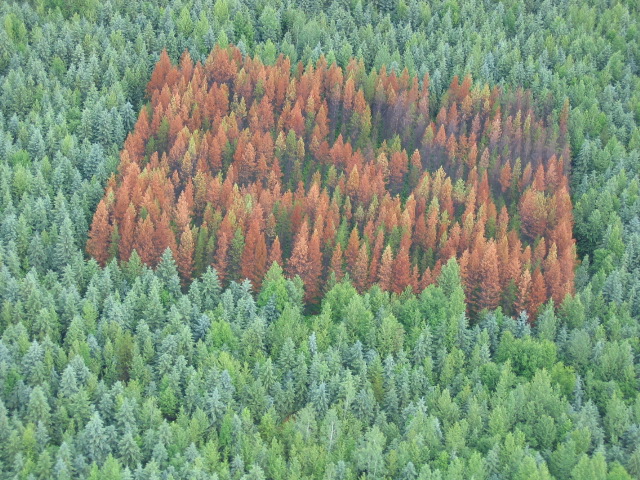Seed transfer and climate change research
The growth, form, wood quality and health of British Columbia's managed forests depend on tree seedlings being adapted to the range of climates over time at their planting location.
B.C.’s seed transfer system will help ensure that B.C.'s planted forests will be adapted to their climatic environment as described in the Chief Forester’s Standards for Seed Use.
On this page
Research program
Forest geneticists in the seed transfer research area are seeking new tools and approaches to deal with the threats posed by climate change. Scientists are increasingly concerned about climate change and predict major changes in climate in the next 50 to 100 years.
The field of genecology, the study of the relationship between patterns of adaptive genetic variation and ecological variation, will improve understanding of the relationship between future climate change scenarios and adaptation in tree breeding programs.
Researchers are exploring opportunities to mitigate negative impacts of climate change on forest health and productivity by using new tools to better match seedlot and site climates and by assisting the migration of seed to keep pace with climate change. These new tools include:
- Geographical Information Systems (GIS)
- Fine-scale climate models
- New analytical techniques
The seed transfer research program has provided substantial support in revising and implementing the Chief Forester’s Standards for Seed Use, representing a consolidation of current knowledge and research results. The program also supports the development of the Gene Resource Conservation and Management Strategy, while contributing to improving industry competitiveness.
Research highlights
|
|
|
|
|
|
|
Forest genetics and climate change resources
Journal articles
- O'Neill, G.A. and Aitken, S.N. 2004. Area-based breeding zones to minimize maladaptation. Can. J. For. Res. 34: 695-704.
- Wang, T., Hamann, A., Yanchuk, A., O'Neill, G.A., and Aitken, S.N. 2006. Use of response functions in selecting lodgepole pine populations for future climates. Global Change Biology 12: 2404-2416.
- O'Neill, G.A., Nigh, G.D., Wang, T., and Ott., P.K. 2007. Growth response functions improved by accounting for nonclimatic site effects. Can. J. For. Res. 37: 2724-2730.
- O'Neill, G.A., Hamann, A., and Wang, T. 2008. Accounting for population variation improves estimates of the impact of climate change on species' growth and distribution. Journal of Applied Ecology 45: 1040-1049.
- McKenney, D.W., Pedlar, J.H., and O'Neill, G.A. 2009. Climate change and forest seed zones: Past trends, future prospects and challenges to ponder. Forestry Chronicle 85: 258-266.
- Wang, T., O'Neill, G.A., and Aitken, S.A. 2010. Integrating environmental and genetic effects to predict responses of tree populations to climate. Ecological Applications 20: 153-163.
- Ukrainetz, N.K., O’Neill, G.A., and B. Jaquish. 2011. Comparison of fixed and focal point seed transfer systems for reforestation and assisted migration: a case study for interior spruce in British Columbia. Can. J. For. Res. 41: 1452-1464.
- Griesbauer, H.P., D.S. Green and G.A. O'Neill. 2011. Using a spatiotemporal climate model to assess population-level Douglas-fir growth sensitivity to climate change across large climatic gradients in British Columbia, Canada. Forest Ecology and Management 261:589-600.
- O’Neill, G.A. and Nigh G. 2011. Linking population genetics and tree height growth models to predict impacts of climate change on forest productivity. Global Change Biology 17: 3208–3217.
- Pedlar, John H., Daniel W. McKenney, Jean Beaulieu, Stephen J. Colombo, Jason S. McLachlan and Gregory A. O’Neill. 2011. The implementation of assisted migration in Canadian forests. Forestry Chronicle 87 (6) 766-777.
- Leech, S., P. Lara Almuedo and G.A. O’Neill. 2011. Assisted Migration: adapting forest management to a changing climate. Journal of Ecosystem Management 12:18-34.
- Kranabetter, J.M., M.U. Stoehr and G.A. O’Neill. 2012. Divergence in ectomycorrhizal communities with foreign Douglas-fir populations and implications for assisted migration. Ecological Applications 22:550-560.
- Pedlar, John H., Daniel W. McKenney, Isabelle Aubin, Tannis Beardmore, Jean Beaulieu, Louis Iverson, Gregory A. O'Neill, Richard S. Winder and Catherine Ste-Marie. 2012. Placing Forestry in the Assisted Migration Debate. Bioscience 62: 835–842.
- Wang, T, E.M. Campbell, G. A. O'Neill and S.N. Aitken. 2012. Projecting future distributions of ecosystem climate niches: Uncertainties and management applications. For. Ecol. Manage. 279: 128–140.
- Oney, B., Reineking, B., O'Neill, G., and Kreyling, J. 2013. Intraspecific variation buffers projected climate change impacts on Pinus contorta. Ecology and Evolution 3: 437-449.
- Pedlar, J.H., D.W. McKenney, I. Aubin, L.R. Iverson, R.S.Winder, C. Ste-Marie and G.A. O’Neill. 2013. Extreme Climate Variability Should Be Considered in Forestry Assisted Migration: A Reply. BioScience 63: 317-318.
- Ikeda, D.H., H.M. Bothwell, M.K. Lau, G.A. O’Neill, K.C. Grady, and T.G. Whitham. 2014. A genetics-based Universal Community Transfer Function for predicting the impacts of climate change on future communities. Functional Ecology 28: 65-74.
- O’Neill, G.A., Stoehr, M., Jaquish, B., 2014. Quantifying safe seed transfer distance and impacts of tree breeding on adaptation. For. Ecol. Manage. 328, 122-130.
- Pickles, B.J., Twieg, B.D., O'Neill, G.A., Mohn, W.W. and Simard, S.W. 2015. Local adaptation in migrated interior Douglas-fir seedlings is mediated by ectomycorrhizas and other soil factors. New Phytologist 207 (3), 858-871.
Technical reports
- O'Neill, G.A., Ukrainetz, N.K., Carlson, M.R., Cartwright, C.V., Jaquish, B.C., King, J.N., Krakowski, J., Russell, J.H., Stoehr, M.U., Xie, C., and Yanchuk, A.D. 2008. Assisted migration to address climate change in BC: recommendations for interim seed transfer standards. Tech. Rep. 048. Victoria, B.C.. British Columbia Ministry of Forests and Range, Research Branch.
- Campbell, E.M., S.C. Saunders, K.D. Coates, D.V. Meidinger, A. MacKinnon, G.A. O'Neill, D.J. MacKillop, S.C. DeLong, and D.G. Morgan. 2009. Ecological resilience and complexity: a theoretical framework for understanding and managing British Columbia’s forest ecosystems in a changing climate. B.C. Min. For. Range, For. Sci. Prog., Victoria B.C. Tech. Rep. 055.
Climate-based seed transfer

The Goat River lodgepole pine provenance test, near McBride, B.C., was almost completely killed by mountain pine beetle attack in 2004.
